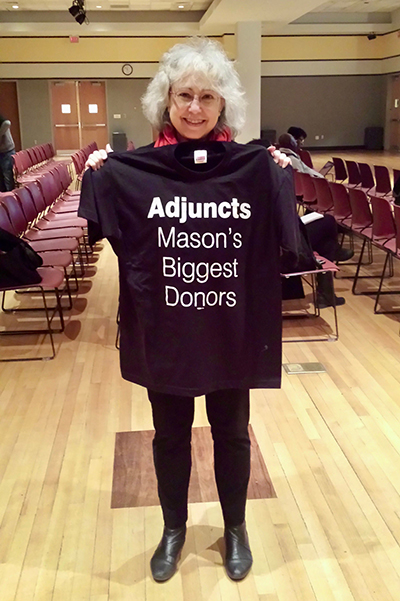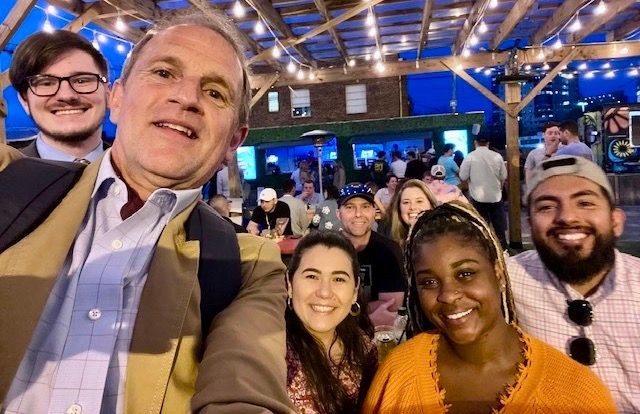In This Story

To the students, the person standing at the head of the classroom imparting wisdom is the “professor.”
Most students are not aware—or even consider—that the professor maybe an associate professor, an assistant professor, a tenure-track professor, an endowed professor, a professor emeritus, a visiting scholar, or even a distinguished visiting scholar. Little do they realize, each title comes with its own privileges and duties.
Add to this age-old academic hierarchy the adjunct professor.
Adjunct instructors are part-time teachers at universities and represent about 40 percent of the total number of professors in the U.S. That is up from 24 percent in 1975.
At George Mason University, there are some 1,360 adjuncts who help teach the school’s 39,000 students.
Since its founding at Mason’s The Institute of Public Policy (TIPP) in 1990, the Schar School of Policy and Government has hired countless adjuncts, hand-picked for their knowledge, experience, and connections in nearby Washington, D.C. Since 2020, the school has employed 130 different adjuncts, with about 50 of them teaching the 1,720 Schar School undergraduate and graduate students at any given time.
Not all adjuncts teach consecutive years, or even semesters, although a few, such as the late D.R. Butler taught undergraduate courses for 20 years. And many teach at multiple universities at the same time—89 percent of them nationwide work at more than one school—while also holding down significant fulltime jobs.
“I teach at other universities in the region when asked, and I serve on nonprofit boards of directors,” said Char Mollison, who also teaches nonprofit management courses at American University. She’s also a senior fellow of the Center for Advanced Governmental Studies at Johns Hopkins University.
Why Mollison does it is typical of adjunct responses to the question.
“The best thing is the opportunity to teach,” said Mollison, who serves on Mason’s Adjunct Faculty Committee, which represents part-time faculty to the university’s administration. “So many of us known as ‘willing adjuncts’ do it because we have expertise in our subject and love to teach. And the opportunity to teach Mason students is a privilege.”
Mollison offered that the quality and enthusiasm of Schar School students makes her job all the more enjoyable.
“I’ve taught at four universities in the region, three of which are private universities,” she said. “The graduate students at Mason are far superior overall: They tend to be a bit older, often with jobs and even families, and they are serious and disciplined about their studies; they don’t take education for granted.”
For Ron Marks, a career CIA agent who, as a visiting professor of cyber and intelligence, teaches national security policy and new technology, said the best thing about teaching is “the interaction with young minds.”
But the life of an adjunct, no matter how enjoyable, offers challenges. Mark Langevin, who has taught in the Global Commerce and Policy program since 2014, said effective planning is a major consideration.
“Since my other professional pursuits take up much of my time, I have to be very careful to plan my time accordingly so that my students can benefit from my teaching, and sometimes, mentoring…I am also inspired by the opportunity to teach and work with students at the Schar School.”
High Profiles, Notable Names
The Schar School has a reputation for hiring part-time faculty members who are well established, widely published, and maintain high profiles in their careers. At one point, two longtime former U.S. Representatives— Tom Davis (R-Va.) and Jim Moran (D-Va.)—taught an undergraduate course together.
Current adjuncts include former CIA intelligence officer and current chief operating officer of the Lawfare Institute David Priess; director of the Center for Climate and Security Erin Sikorsky; chair of the Board of Commissioners of the Virginia Port Authority John G. Milliken, also a former Virginia secretary of transportation; former Virginia Lieutenant Governor Bill Bolling; former minister of finance and development of Eritrea Gebreselassie Tesfamichael; and others. New to the staff this year is former Virginia Secretary of Education Atif Qarni.
They come to the Schar School by reaching out to administrators to networking with current and past faculty to being in the right place at the right time. Ashley Grant, a group leader of Counter Weapons of Mass Destruction at the nonprofit government research institute the MITRE Corporation, asked an adjunct acquaintance if the school was in need of anyone with her expertise.
“As luck would have it,” she said, “they were looking for a professor to teach Global Health Security.” She began in 2019.
Special Guest Speakers Abound
Like many Schar School adjuncts, relationships in their professional fields run deep and as such, many distinguished practitioners make classroom appearances as guest speakers.
For instance, Marks recently invited Jon Rosenwasser, budget director of the Senate Select Committee on Intelligence, to speak to Marks’ Congress and Intelligence class. “He summarized the class beautifully without being asked and reinforced all the lessons from the term,” Marks said. “The students were thrilled.”
“I try to recruit speakers who offer much different, often foreign or international perspectives,” said Langevin. “Given my expertise in Latin America, I have presented Brazilian and Chilean trade policy experts and diplomats to my students. I also bring in former students who can speak with authority on a particular issue intersecting the course content.”
John Byrne, a longtime expert in illicit crimes, teaches a seven-year-old course called International Money Laundering, Corruption, and Terrorism. He’s also the former executive director of the Association of Certified Anti-Money Laundering Specialists (ACAMS).
“Our model is to expose students to a variety of experts from the ACAMS board and in the [money laundering] community,” he said. Les Joseph, a former adjunct at the Schar School and chief of the financial investigation section of banking giant Wells Fargo & Company, guests lectures in Byrne’s classroom, as do Dennis Lormel, the first head of the FBI’s Terrorist Financing Operation Section; Don Fort, former chief of the IRS Criminal Section; and Sara Crowe, the staff expert on financial issues for Polaris, the anti-human trafficking organization.
In addition to sharing their experiences and knowledge, Byrne hopes the guest speakers “offer the students insight to how a career in this field, whether in the government or the private sector, can assist society. I am happy to report that a number of students have stayed in touch and have progressed in our community.”
For her part, nonprofit expert Mollison brings one or two guest speakers to each class. “I have been able to make use of global connections from my career,” she said, particularly when the classes are online.
‘Long-Term Relationships’
Teesta Ghosh has been a consistent part-time instructor at the Schar School since 1999, after reaching out to the emerging policy school at Mason. “Since then, I have not looked back,” she said. Courses she has taught include International Relations, Democracy in Global Perspective, International Law and Organizations, and Politics of South Asia.
Ghosh’s respect for her students exemplifies the earnest effort many of the Schar School adjuncts bring not only to the classroom but beyond—and it earned her a nomination for Teaching Excellence and Mentorship Award at Mason.
“I have done my best to support my students, the department, and the university over the years,” she said. “I write many letters of recommendations for students who are applying for either jobs, graduate school, or internships every semester and also during my summer break when I do not have any teaching responsibilities. And I have mentored students who have reached out to me to do independent studies—remuneration for which is token—and undergraduate research projects.”
As for “the best part” of being an adjunct, Ghosh said the answer was easy: “It’s the long-term relationships that I have developed with my students in the 23 years that I have taught here.”
Sometimes it’s the professor who is the student: “I have learned a lot from my students as well,” she said. “Mason has a very diverse student body, with students coming from many different countries around the world. Since I teach international politics, it has opened my eyes to their personal experiences—for example, as a refugee—and to cultural, social, and political nuances of their countries, which I would have no way knowing even if I read hundreds of scholarly books and articles.”
Last question: Are you an “easy A”?
“Good question!” she replied. “My answer is: It depends on who you ask. I have received both bouquets and brickbats from my students—but that, of course, is part of the job.”

